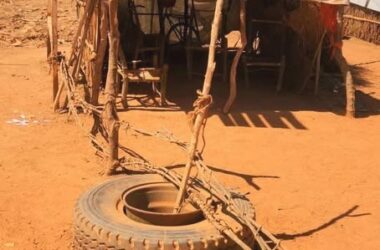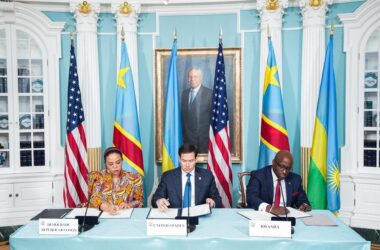By Mamer Abraham
Economists have identified inconsistencies in the allocation of 5% of oil revenue to oil-producing states and communities.
Ariic David, an economist for the Sudd Institute who presented research on the allocation of 5% of oil revenue, revealed that communities in oil-producing states are owed approximately $943 million, based on calculations of two and three percent allocation.
“The producing communities are owed a cumulative total of 573 million dollars. The time period is 2011/12 to 2022/23. Similarly, for two percent parse, not also calculated well, the oil-producing states are owed 370 million dollars equivalent,” Ariic explained in his research presentation.
He argued that the Petroleum Revenue Management Act was not being properly implemented intentionally for personal gain by some key members of the government oversight committees formed for the implementation of the five percent.
“The Petroleum Revenue Management Act is clear, but it is not being used properly intentionally. The calculation is wrong. The three percent share has not been properly disbursed to petroleum-producing communities as per my calculations,” he argued.
The researcher added that there was a fault in the calculations, and some percentages might have been transferred elsewhere instead of being transferred to the rightful accounts of the communities.
He recommended that the petroleum-producing states should be disbursed their rightful shares as stipulated in the act.
Oliver Denis, a technical consultant at the Ministry of Petroleum, admitted that there were miscalculations in regard to the confusion between gross and net petroleum revenue in the Petroleum Revenue Management Act.
“It seems like most of the presentations are all the same, and we all discussed the modality and the matrices on how those two percent and three percent should be paid,” he said.
“…and I will also include some examples just to clarify a few points on the study that was done by Sudd Institute in terms of calculations because there is a bit of confusion between the gross petroleum revenue and the net petroleum revenue,” he continued.
Oliver stated categorically that the counties that received 55 percent of the five percent of petroleum revenue allocated to the petroleum-producing states and areas were those with physical oilfields, whereas the neighboring counties only received 45 percent of the five percent of petroleum revenue.
“Now these eight counties—some of them do have physical oil fields present in those counties, some of them do not have. Those who have a physical presence of oil fields are the counties that get 55 percent. Those who do not have, they get 45 percent,” he explained in his presentation.
Oliver recommended that the government should transparently transfer the funds to the petroleum-producing counties for the benefit of the communities living there who are adversely affected by oil production.
“Basically, this is our recommendation; the government of the Republic of South Sudan should continue fulfilling its legal obligations by transferring the funds in transparency to the states, administrative areas, and communities with subsequent budgets,” he hinted.
“Disclose key information about allocations, transfers, and spending of the net petroleum revenues for the producing states and communities as provided for in the petroleum law. This is the most important one.” He added.
Fraudulent act.
The Upper Nile representative of the Community Development Commission (CDC), Adam Awuol Kiir, in one of the counties, said the percentage allocated to the counties was delayed for even three months, and when some months are skipped, the payment will not be made again.
“Concerning the three percent allocated to the counties, we don’t receive them at times. And when you receive them, you will receive them after three months, and the months that you miss, you will not get them.” He disclosed.
“That one will need clarification from the Ministry of Finance and the Ministry of Petroleum because the matrices are sent monthly.”
The commissioner of Maban County, Peter Alberto, said Maban County is an oil-producing county in Upper Nile State and yet is entitled to only 45 percent, contrary to the 55 percent indicated in the document he obtained from the Ministry of Petroleum.
He said the people of Maban called for rectification of the mistake. They also threatened to sue the ministry for unclear allocation, which he said was an injustice.
“And when we talk of the economy, it means injustice. And one of them is the delay, which is part of the injustice. Unfair employment and unfair distribution,” he echoed.
“I said yesterday that I should be answered today, starting with Maban. Maban is one of the producing counties, and it is getting 45 percent. Maban is entitled to 55 percent. And I got the document; I took the document myself from the Ministry of Petroleum last year.” He continued.
Peter further challenged the research carried out by the Sudd Institute for not mentioning the oilfields in which they carried out the research.
“The research made here should also tell us the fields; you must name the fields. I challenge every research made in this sector that you should name them; you should give them names. Where did you get these? And this is very sensitive; I was seriously following the research done by Sudd. They should have gone to the places and named the places,” he challenged.
“And that is why when the expectations of the communities are raised to this, it turns into a problem; it gets into a conflict. When it is a problem, they say it is a problem of the communities. When it is oil, they say, no, it is a national thing.”
Punishment awaits.
On Tuesday, the Vice President for Service Cluster stated during the opening of the Third High-Level Meeting on Environmental Issues and 5% oil revenue allocation in oil-producing states and administrative areas that some committees that were formed to oversee the allocation of five percent turned fraudulent.
He warned that those who were found to have been planting seeds of discord and messing up with the percentages allocated to the oil-producing communities would be punished.
He stated that the government should come up with proper policies that will ensure the petroleum-producing states are allocated their rightful share according to the Petroleum Revenue Management Act.




